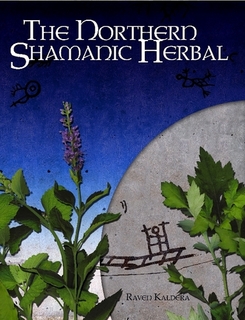The Northern Shamanic Herbal
These pages (and book they grew into) developed from my work with plant spirits, but especially my work with the Nine Herbs Charm from the Lacnunga. In addition to the Nine Sacred Herbs--Mugwort, Plantain, Watercress, Viper's Bugloss, Chamomile, Nettle, Sweet Cicely, Fennel, and Crab Apple--I've included a good variety of other herbs that were sacred to Norse/Germanic/Saxon deities, or just known and used by those particular ancestors. While I've found good magical uses for all the European herbs and many American ones, these would be the ones to plant if you wanted a specifically northern-tradition herb garden in one area. Some of the plants listed below are trees, which are not exactly garden material, but could be planted close by (in the case of large ones like birch or oak) or at the edge or center of the garden (in the case of smaller trees such as elder or crabapple).
After some thought, I decided to list the trees and plants by their associated deities, with the ones that aren't associated with any particular ones in alphabetical order after that. For some, there is no lore-based information that this plant is liked by that deity; they just seem to like it in the experience of myself and others who work with both these gods and these plants. In these cases, I have written that this deity "seems to like" this plant a great deal; go ask them yourselves.
Information about the Herbs
- The Nine Sacred Herbs Mugwort, Plantain, Watercress, Viper's Bugloss, Chamomile, Nettle, Sweet Cicely, Fennel, Crab Apple
- Thor's Herbs Garlic, Hawthorn, Houseleek, Leek & Onion, Oak, Thistle, Tormentil
- Odhinn's Herbs Ash, Elm, Horehound, Parsley, Rowan, Woad
- Heimdall's Herbs Angelica, Cumin
- Tyr's Herbs Wolvesbane, Mustard
- Freya's Herbs Cowslip, Primrose, Strawberry, Daisy, Linden
- Frey's Herbs Barley, Cherry, Coltsfoot, Hops, Lemonbalm, Rye, Wheat
- Frigga's Herbs Birch, Lady's Mantle, Shepherd's Purse, Thyme, Weld, Flax
- Plants of Frigga's Handmaidens And Helpers Beech, Clover, Comfrey, Heather, Lovage, Maple, Marshmallow, Mints, Pennyroyal, Sorrel
- Holda's Herbs Elder, Broom, Madder, Teasel, Wild Rose
- Sif's Herbs Goldenrod, Meadowsweet
- Walburga's Herbs Sweet Woodruf, Tansy
- Jormundgand's Herbs Willow
- Baldur's Herbs St. John's Wort
- Aegir's Herbs Alecost, Ground Ivy
- Herbs for the Norns Vervain
- Loki's Herbs Alder, Mullein, Mistletoe, Sweet Flag Iris
- Plants of Helheim Hemlock, Rue, Wormwood, Yarrow, Yew
- Other Herbs Agrimony, Betony, Chicory, Dandelion, Dill, Dock, Elecampane, Feverfew, Fir, Foxglove, Good King Henry, Horseradish, Fir, Icelandic Moss, Juniper, Lambsquarters, Lily of the Valley, Lupine, Roseroot, Valerian
- Entheogenic Plants Poppy, Belladonna, Hemp, Henbane, Fly Agaric
- Frequently Asked Questions more information about the herbal
Note: Before you use any plant for shamanic rituals or magic, I strongly suggest that you go sit with it, smell it, touch it, eat some if it's not poisonous, and generally communicate with the plant spirit. It may not like you. No matter who you are, there will be some plant spirits who just won't cooperate for you, or perhaps they will cooperate later, when you're more experienced. If you have nowhere to grow herbs, go visit someone else's herb garden to sit with the plants. You might want to go on a day when they're weeding, so as to trade some help in exchange. For those of us with herb gardens, the weeding is a constant battle.


